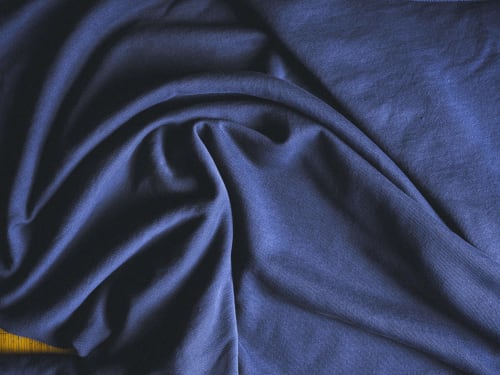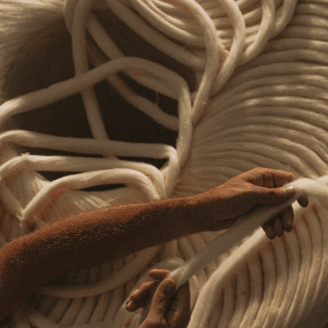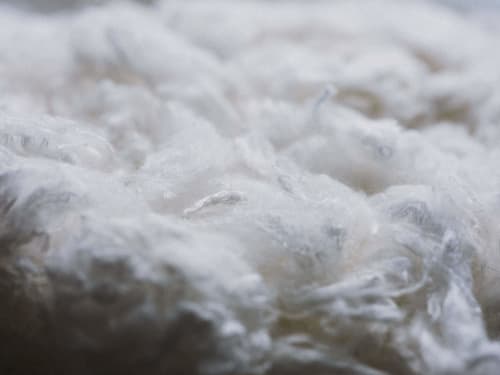Our Impact
The sourcing and manufacturing of the materials we use in our products accounts for 78% of our greenhouse gas emissions, making them the biggest factor in our carbon footprint. However, our responsibility goes beyond emissions - our material choices also affect water use, biodiversity, and waste management.
That’s why we prioritize preferred materials, such as recycled and responsibly sourced options, while also exploring innovations that can reduce our impact without compromising quality of our products.
Rethinking Materials: Our Approach
As there is no legal definition of ‘preferred’, we define preferred materials in alignment with Textile Exchange, a global non-profit dedicated to advancing sustainability in fashion and textiles.
To ensure we have clear rules on which materials are considered preferred, how they are sourced, certified and traced, we have Standard Operating Procedures (SOP) in place. These SOPs exist for all major materials in the adidas product portfolio.
Transparency is central to our approach—we share insights on our materials, their environmental footprint, and our efforts to reduce their negative effects. See our annual report for a detailed breakdown of our material consumption in 2024
Collaboration with suppliers, innovators, and industry organizations is essential to transforming materials, addressing challenges, and scaling solutions. Learn more on our Nature and Circularity pages.
The materials we use
Every material comes with unique challenges and opportunities, no matter if it is of natural or synthetic origin. Here’s how we’re making progress:
Synthetic Materials
Synthetic materials such as polyester, polyamide, and elastic polymers are important for performance apparel and footwear, providing durability, flexibility, and moisture-wicking properties. However, their production is energy-intensive and petroleum-based. To reduce our impact, we’re scaling recycled content and exploring bio-based alternatives.
Polyester
Polyester

In 2023, 99% of all polyester used in our products was made from recycled content, a level we have maintained in 2024. As our most-used material, this shift significantly reduces our environmental footprint, but we're not stopping there.
In 2024, we set ourselves a new, more ambitious target for recycled polyester: to transition from using recycled plastic bottles to using recycled textile waste as feedstock. We aim to achieve 10% of our polyester volume coming from textile waste by 2030. We are convinced that setting and communicating this target is also a signal to the industry and can enable our suppliers to scale up commercially viable offers for textile-to-textile recycled polyester.
Certification of Recycled Materials
We use recognized third-party standards to ensure the integrity of our recycled polyester. Certifications like the Global Recycled Standard (GRS) and the Recycled Claim Standard (RCS) help verify the authenticity of the materials, minimizing the risk of mixing or mislabeling.
Elastic Polymers (EVA)
Elastic Polymers (EVA)

EVA is a material frequently used in footwear. We are expanding the use of recycled EVA (ethylene-vinyl acetate) in our products, although current options have performance limitations that restrict wider adoption. We are also exploring bio-based EVA, which replaces petroleum-based inputs with renewable sources like sugarcane or corn. However, biobased materials may also have negative impacts on the environment which need to be considered when choosing the raw material.
As new materials evolve, we are assessing their potential for broader use while ensuring they meet our requirements for durability, flexibility, and functionality in performance products.
Polyamides
Polyamides
We have already integrated recycled polyamides into many products and continue to refine our approach. While biobased polyamides are still in early development, scaling them remains challenging due to limited availability and performance. We’re closely monitoring advancements and will adopt new materials as they reach the necessary quality and scale.
Nature-Derived Materials
Nature provides essential materials with unparalleled properties such as breathability and grip, but sourcing them can impact ecosystems, biodiversity, and local communities. We’re committed to more responsible sourcing by using certified materials, increasing recycled content, and exploring alternative solutions. Additionally, we’re enhancing traceability and transparency across our supply chain as part of our ongoing efforts to understand and reduce our impact on nature.
Cotton
Cotton

Since 2018, we’ve used only third-party certified cotton from standards such as Better Cotton and U.S. Cotton Trust Protocol, as well as organic cotton and recycled cotton. To reduce the environmental impact of cotton, we’re focusing as a first step on gaining transparency into the origin of the cotton, and ultimately aiming for full traceability:
- Transparency: Most of our cotton is Better Cotton certified, a standard that currently uses a mass balance approach (not traceable to the country of origin). In 2024, we worked with strategic suppliers to gather self-declared country-of-origin information for the Better Cotton used in our products.
- Traceability: The cotton we source from the U.S. Cotton Trust Protocol is traceable to its country of origin (U.S.A) through a chain of custody. In 2024, we joined Traceable Better Cotton which will allow us in future to source product-segregated cotton, traceable to its country of origin.
As part of our commitment to sustainable material sourcing, adidas is a proud member of the Organic Cotton Accelerator (OCA), an organization committed to promoting the use of organic cotton.
We’re also advancing cotton recycling—using mechanically recycled cotton to repurpose production waste and piloting chemically recycled cotton with Infinited Fiber Company, to turn post-consumer cotton waste into new fibers.
Natural Rubber
Natural Rubber

We’re improving the sustainability of our natural rubber sourcing by increasing the use of certified rubber, recycled content, and are also scouting innovative alternatives. To enhance transparency into our natural rubber supply chain, we have launched a supply chain mapping initiative. With this, we gain more knowledge about the origin of the rubber and get to know key actors further upstream. In the coming years, we’ll use these insights to strengthen our end-to-end understanding of our supply chain and implement respective measures to lower our impact further.
Animal-Derived Materials
Animal-Derived Materials
Animal-derived materials account for 5.7% of the materials we use at adidas (2024), with leather being the most significant. While these materials provide durability, insulation, and other performance benefits, their sourcing requires important considerations.
For this reason, we put in place an Animal-Derived Materials Standard that all suppliers must meet. Our focus is on sourcing responsibly, respecting animal welfare, safeguarding ecosystems, and maintaining ethical supply chain practices.
leather

We’re holding our leather sourcing to high standards by using tanneries certified by the of Leather Working Group (LWG), an organization that promotes better environmental practices in the leather industry.
Additionally, we’re mapping our leather supply chain to enhance traceability and identify deforestation risks, which is one of our key concerns when it comes to bovine leather.
Our goal? 100% deforestation- and conversion-free bovine leather by 2030 or earlier.
Learn more about our commitment to deforestation - and conversion-free leather on our Nature page.
Transitioning Away from Kangaroo Leather
In 2024, adidas decided to stop purchasing kangaroo leather and will gradually replace it with other types of leather.
down

Down offers exceptional insulation, but we acknowledge the animal welfare concerns associated with its production. That's why 100% of our down is certified to the Responsible Down Standard (RDS)—ensuring it comes from responsible sources that consider animal welfare.
wool

In 2024, we achieved our goal of using only Responsible Wool Standard (RWS)-certified wool in adidas products. RWS-certified farmers and ranchers follow strict requirements for animal welfare and land management, as well as social responsibility standards regarding the farm workers.
Man-Made Cellulosic Fibers (MMCF)
Man-Made Cellulosic Fibers (MMCF)

Although MMCFs make up less than 0.2% of our total materials volume, we are committed to sourcing them responsibly. We prioritize MMCFs from responsibly managed forests to reduce deforestation risks. As part of our deforestation-free materials ambition, we’ve partnered with Canopy Planet to map our MMCF supply chain. This collaboration helps us identify Tier 4 suppliers (fiber producers), assess potential risks and put in place respective targets and measures.
Additionally, we’re exploring ways to improve the chemical processes involved in fiber production of MMCFs to minimize environmental impact.
WHAT ABOUT PACKAGING?

Packaging protects our products from humidity, dust, and damage during shipping and storage. Most of our packaging is made from paper and carton, with only about 3% from plastic (primarily recycled low-density polyethylene (rLDPE) used for apparel protection). We also use paper-based transport boxes made from corrugated cardboard for shipping and storage.
Packaging decisions – such as choosing the packaging size, amount and type of packaging material – can significantly affect the efficiency and the sustainability of operations.
Our Approach
We currently focus on reducing the impact of packaging by optimizing box sizes and the number of shipments. We also avoid packaging where not absolutely necessary, ie. by eliminating plastic packaging for some accessory types, such as socks.
Obtaining primary data for our packaging is still a challenge due to the decentralized nature of our supply chain. This is why we currently estimate most packaging volumes. However, we aim to start collecting primary packaging data for key parts of the supply chain in the upcoming years to measure our progress.
Since 2016, all carrier bags in adidas retail stores have been made from recycled paper.
Our approach to Fiber Fragmentation
We’re aware that textile products release microfibers during manufacturing processes and also during product use due to washing, change of temperature, humidity or UV exposure. These microfibers can have a negative environmental impact on soil, air, and water; however, there is still little scientific research available to holistically approach the root causes. We acknowledge that fiber fragmentation is a complex challenge for our industry, but one that we are proactively addressing by working with various external research partners.
adidas is also a member of The Microfibre Consortium (TMC), an organization that works to connect academic research and translate it into solutions for the textile industry.
Material Credentials at a Glance
We rely on recognized certifications to ensure our materials meet the highest standards for sustainability and ethics. Below, you’ll find a quick overview of the certifications we apply across our key materials. Browse the grid to explore them.

COTTON
100% of our cotton is third party certified, including Better Cotton, U.S. Cotton Trust Protocol, organic, and recycled cotton. All organic cotton we use is certified by the Global Organic Textile Standard (GOTS) or the Organic Content Standard (OCS). All recycled cotton yarns used in adidas products are certified under the RCS (Recycled Claim Standard) or GRS (Global Recycled Standard).

POLYESTER AND POLYAMIDE
In 2024, 99% of the polyester used in our products was recycled polyester. All recycled polyester and recycled polyamide yarns used in adidas products are certified under the RCS (Recycled Claim Standard) or GRS (Global Recycled Standard).

down
100% of the down used in adidas products is certified under the Responsible Down Standard (RDS).

leather
99% of our leather is Leather Working Group (LWG) certified, with most sourced from Gold-rated tanneries, the highest possible rating.

wool
100% of the wool used in adidas products is certified under the Responsible Wool Standard (RWS).
Materials
At adidas, everything starts with the materials. They shape performance, quality and comfort of products, and our impact on the planet. That's why we're committed to using materials that deliver for athletes and the planet.
Materials
At adidas, everything starts with the materials. They shape performance, quality and comfort of products, and our impact on the planet. That's why we're committed to using materials that deliver for athletes and the planet.